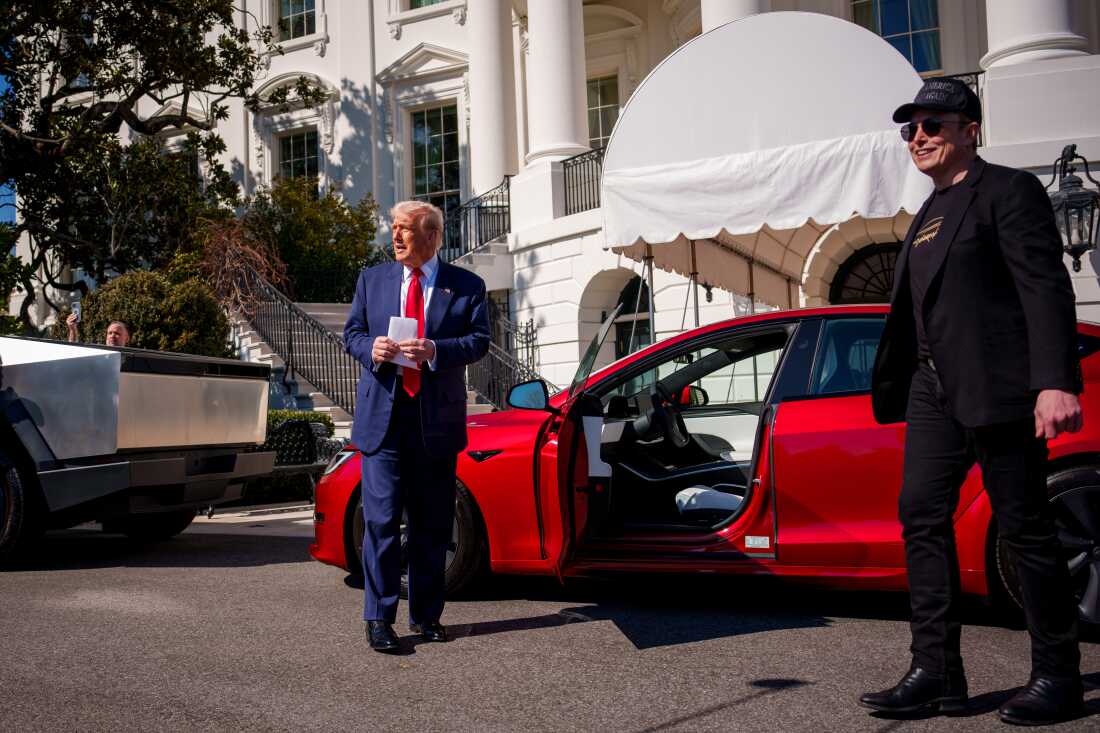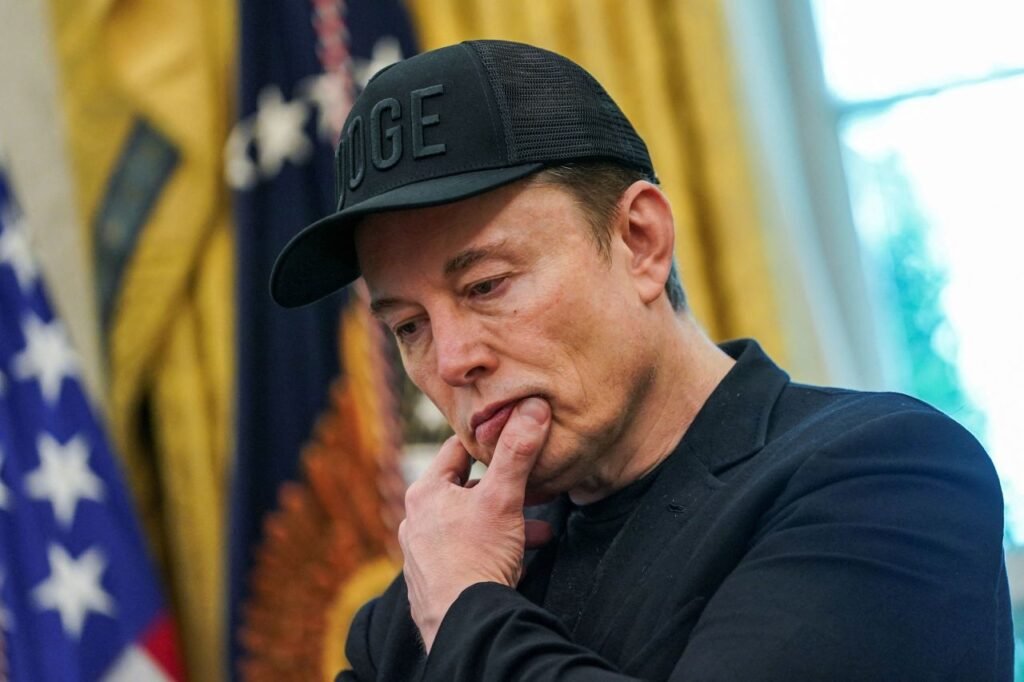
Elon Musk gives a tour to then-President-elect Trump and lawmakers of the control room before the launch of a SpaceX Starship rocket on Nov. 19, 2024, in Brownsville, Texas. Musk’s businesses have been built with billions of dollars of government support that could be at risk after his relationship with Trump ruptured this week.
Brandon Bell/Getty Images
hide caption
toggle caption
Brandon Bell/Getty Images
“If I cared about subsidies,” Elon Musk said in 2015, “I would have entered the oil and gas industry.”
Yet the history of Musk’s business empire tells another story.
Musk’s companies have long been fueled by taxpayer money, whether in the form of massive government contracts, low-interest loans, tax breaks and other support that helped make Musk one of the world’s richest people.
Over the past two decades, firms run by Musk have received tens of billions of dollars in federal backing.
One tally, by The Washington Post, found that at least $38 billion in government support has been funneled to Musk’s companies, an estimate that likely undercounts the breadth of support since some defense and intelligence contracts are not publicly available.
In turn, the U.S. government has become reliant on Musk, from space travel, to national security to the future of green transportation.
So when President Trump on Thursday threatened to end Musk’s government subsidies and contracts in a spiraling feud between the former political allies, it was greeted with some skepticism.
Musk has deep ties to the U.S. space program and intelligence community
Musk’s companies have become inextricably tied to the federal government, particularly SpaceX’s crucial role in the U.S. space program.
The company’s rockets now provide the only way for U.S. astronauts to get to and from the International Space Station.
“While their political partnership appears to be at an end, it is difficult to imagine the government cancelling SpaceX contracts anytime soon,” said Dan Grazier, senior fellow and program director at the Stimson Center, a think tank focused on national security.
“It will be some time before any of the company’s competitors will be able to take up the slack, so it looks like the president and the tech mogul will have to find a way to get along,” he said.
It’s unclear if Musk was trolling or being serious, but he responded to Trump’s threats by saying SpaceX will begin decommissioning its Dragon spacecraft, which has been used for years to ferry crews and cargo to the space station.
In fact, there are now astronauts at the station. They were brought there by a SpaceX capsule.
Walking away from the federal government would strand those crew members and complicate the Trump administration’s goal of landing astronauts on the moon in the coming years.
Later on Thursday, Musk appeared to backtrack, writing on X: “OK, we won’t decommission Dragon.”
SpaceX is also building hundreds of spy satellites for the Pentagon, Reuters reported in March, work that, if abandoned, could have national security implications and prompt a backlash from the intelligence community.
In addition, SpaceX’s Starlink satellite network is a player in a multi-billion-dollar federal effort to expand internet access to underserved parts of the country.
Ukraine has also relied heavily on Starlink services since Russia launched a full-scale invasion of the country in 2022, leading top Pentagon officials to coordinate directly with Musk, The New Yorker has reported.
Federal support for Tesla and electric vehicle infrastructure in doubt
Tesla, the biggest electric vehicle company in the U.S. (which also controls the country’s largest charging network), has been a major beneficiary of federal support.
That’s likely to change under the massive congressional reconciliation bill being championed by Trump.
The version of the bill passed by the House would chop consumer tax credits for buying electric vehicles and slash federal funding for charging stations.
While auto industry experts view those cuts as hurting legacy automakers more than Tesla, Trump accused Musk of not supporting the bill because it gutted subsidies for electric vehicles.

President Trump and Musk inspect Tesla vehicles in front of the White House on March 11, 2025.
Andrew Harnik/Getty Images
hide caption
toggle caption
Andrew Harnik/Getty Images
Musk has previously opposed the EV tax credits, viewing them as mostly benefiting his competitors, but he changed his tune as Tesla’s profits and sales plummeted globally since Musk began overseeing mass layoffs and other shake-ups to the federal government through the cost-cutting unit, the Department of Government Efficiency.
The end of federal programs aimed at growing the EV sector would not damage Tesla as severely as other problems the automaker is confronting, said John Helveston, a professor at George Washington University who studies the electric vehicle industry.
“Musk hasn’t done Tesla any favors by taking extremely unpopular actions in his time at DOGE, and globally the business is struggling from other decisions, like focusing on the Cybertruck instead of releasing more new practical models that consumers actually want,” he said. “In the European Union, sales are down heavily from the political damage, and sales in China are down from intense competition of very competitive Chinese EVs.”
During the Biden administration, Congress devoted billions of dollars to expand electric vehicle charging stations nationwide. A major pillar of this plan was having Tesla make its chargers compatible with other vehicles, something Tesla agreed to in exchange for a slice of the federal funds. That plan has been halted by the Trump administration, even before Congress tried to pass the Trump-backed tax policy bill that would roll back support for EVs even more.
Jeffrey Sonnenfeld, an associate dean at the Yale School of Management, said further pain for Tesla could eventually plunge Musk’s riches.
“Tesla is hugely reliant on federal largesse for the build-out of EV charging infrastructure, not to mention federal regulatory approval for his continued autonomous driving and robotics experiments,” Sonnenfeld said.
“His wealth is highly precarious,” he said, noting that most of Musk’s fortune is tied to his stake in Tesla. “The reality is that Musk’s position is far weaker than many realize.”
Subsidies or not, Musk will ‘continue to thrive’
The acrimonious Trump-Musk implosion on Thursday came only months after Trump transformed the driveway of the White House’s South Lawn into a Tesla showroom, and after the White House tapped Starlink to help expand internet across the White House campus.
Both were performative gestures that crystalized the billionaire’s cozy relationship with the president, who was willing to shill for Musk after he dished out more than a quarter-billion dollars to support Trump’s run for president.
So will the Trump-Musk breakup cut the opposite way and inflict pain on Musk’s companies?
Paul Levinson, a professor at Fordham University, said perhaps it will lead to more short-term stock market drops for Tesla and a hit to his wealth. But even if some of the federal money that flows to Musk’s business empire disappears, it will not likely hamper the billionaire in the long run, he said.
“Musk has ample resources to sustain those losses, reshuffle and rebuild his companies and holdings, and come out ahead and on top,” Levinson said. “Bottom line: if all the Trump government does in its feud with Musk is attack his financial interests, Musk is very likely to not only survive but continue to thrive.”












